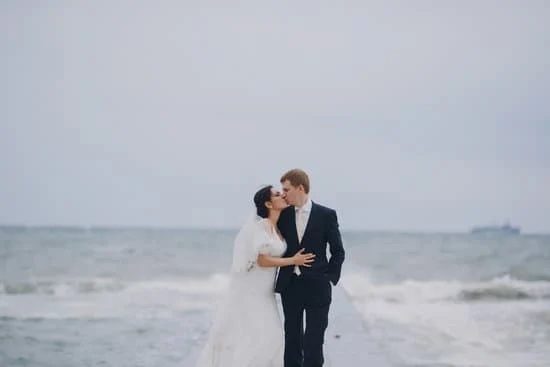Planning a wedding is an exciting and joyful time, but it also comes with a lot of details to consider. One important aspect of wedding planning is managing the RSVP process. Knowing when should RSVPS be due for a wedding is crucial for ensuring that everything runs smoothly on the big day. From setting a deadline for RSVPs to handling late responses, there are several factors to take into account when managing this process.
Setting a clear and reasonable deadline for RSVPs is essential for any couple planning their wedding. Not only does it help with finalizing the guest list and seating arrangements, but it also allows for proper planning in terms of food, beverages, and favors.
In this article, we will explore the importance of setting an RSVP deadline, factors to consider when choosing a date, recommended timeline for sending out invitations, consequences of late responses, and tips for effectively communicating the deadline to guests.
By understanding the significance of the RSVP process and knowing how to manage it effectively, couples can alleviate some of the stress associated with wedding planning. So when should RSVPS be due for a wedding? Let’s dive into the details and explore all you need to know about this critical aspect of your special day.
Importance of Setting a Deadline for RSVPs
Setting a clear deadline for RSVPs is crucial for planning a successful wedding. Without a firm RSVP deadline, it becomes challenging to finalize important details such as the seating arrangement, catering numbers, and overall event logistics. Here are some factors to consider when setting an RSVP deadline:
Factors to consider when setting an RSVP deadline:
– Guest travel time: If you have guests traveling from out of town, it’s essential to give them enough time to make their arrangements and respond to the invitation. Consider mailing the invitations at least 8-12 weeks before the wedding date.
– Venue requirements: Check with your venue on how far in advance they need final headcounts and any specific deadlines they may have for catering or other services.
– Time for follow-ups: Give yourself enough time to follow up with guests who haven’t responded. It’s common for some guests to forget or overlook their RSVP, so having a buffer period for follow-ups is essential.
Recommended timeline for sending out wedding invitations:
1. Save-the-date cards: Send these out 6-8 months in advance, especially if you have many out-of-town guests or a destination wedding.
2. Wedding invitations: Mail these 8-12 weeks before the wedding date, along with all necessary information including the RSVP deadline.
Consequences of late RSVPs can include not having an accurate headcount for catering, additional stress in rearranging seating charts and tables, and unnecessary delays in finalizing other important details for the big day. It’s vital that guests understand the importance of adhering to the RSVP deadline in order to ensure a smoothly executed event.
Factors to Consider When Setting an RSVP Deadline
When it comes to setting an RSVP deadline for your wedding, there are several factors to consider in order to ensure that you receive the responses you need in a timely manner. Here are some important considerations to keep in mind:
- Wedding Date: The date of your wedding is perhaps the most crucial factor to consider when setting an RSVP deadline. Ideally, you should set the deadline at least 3-4 weeks before the wedding date to allow enough time for finalizing seating arrangements, catering numbers, and other logistical details.
- Vendor Requirements: It’s important to check with your venue and caterer about their specific RSVP deadlines. Some vendors may require a final headcount earlier than others, so be sure to take this into account when setting your own deadline.
- Travel and Accommodation: If many of your guests will be traveling from out of town or require accommodation, it’s considerate to set the RSVP deadline earlier to give them ample time to make their arrangements.
Setting a clear and reasonable RSVP deadline is crucial for ensuring that everything runs smoothly on your big day. By taking these factors into consideration, you can set a deadline that works best for both you and your guests.
Keep in mind that communication is key throughout this process. Clearly communicate the RSVP deadline on your invitation and any accompanying materials, such as wedding websites or save-the-date cards. Additionally, don’t hesitate to follow up with guests who have not responded by the deadline in a polite and respectful manner. Ultimately, setting a well-thought-out RSVP deadline will help alleviate stress leading up to your wedding day and ensure that everything goes off without a hitch.
Recommended Timeline for Sending Out Wedding Invitations
Sending out wedding invitations is an important step in the wedding planning process, and it’s crucial to establish a timeline for when they should be sent out. The timing of sending out wedding invitations can greatly impact when RSVPs should be due, so careful consideration should be given to this aspect of the planning process.
Factors to Consider
When determining the timeline for sending out wedding invitations, there are several factors to consider. These include the location of the wedding, whether guests will need to travel or make accommodations, and any potential scheduling conflicts that may arise. It’s also important to take into account the time needed for guests to respond, especially if there are international guests who may require additional time to make travel arrangements.
Recommended Timeline
As a general guideline, it is recommended to send out wedding invitations approximately 8-10 weeks before the wedding date. This allows guests enough time to mark their calendars, make any necessary travel arrangements, and RSVP by the requested deadline.
It is important to note that for destination weddings or events taking place during peak travel seasons, invitations should be sent out even earlier to give guests ample time to plan. Additionally, for local weddings with many out-of-town guests, consider sending save-the-date cards well in advance of the formal invitation to give everyone plenty of notice.
Consequences of Late RSVPs for Wedding
When it comes to planning a wedding, late RSVPs can have significant consequences for both the couple and the guests. It’s important to communicate the RSVP deadline clearly and consider the impact of late responses.
Food and Seating Arrangements
One of the major consequences of late RSVPs for a wedding is the impact it can have on the catering and seating arrangements. Caterers often require final numbers well in advance, so late responses can make it difficult to provide accurate meals for all guests. Additionally, seating charts can be disrupted if the final headcount is not received in a timely manner, leading to confusion and overcrowding at the event.
Extra Costs
Late RSVPs can also result in additional costs for the couple. For example, if they have already paid for a set number of meals and more guests respond after the deadline, they may need to cover the cost of unexpected meals. Similarly, last-minute changes can affect other elements such as favors or rental items, potentially adding unforeseen expenses to an already tight budget.
Inconvenience for Guests
Late RSVPs can cause inconvenience for other guests who have responded by the deadline. It may not be possible to accommodate late responders with preferred seating or meal choices, leading to disappointment or discomfort for those who followed the requested timeline. Additionally, last-minute changes can impact transportation and accommodation plans for out-of-town guests.
Overall, setting a clear RSVP deadline for a wedding is crucial to avoid these negative consequences and ensure a smooth and enjoyable event for everyone involved.
Tips for Effectively Communicating the RSVP Deadline to Guests
When it comes to planning a wedding, one of the most crucial aspects is managing the guest list and ensuring that you receive timely responses from your invitees. Setting a clear RSVP deadline for your wedding is essential, but effectively communicating this deadline to your guests is equally important. Here are some tips to help you ensure that your guests understand when their RSVPs are due.
First and foremost, make sure to clearly state the RSVP deadline on the invitations. Whether you opt for traditional paper invitations or digital ones, including a separate card or section indicating the deadline by which guests should respond is key. This ensures that there is no confusion about when their response is expected and helps them plan accordingly.
In addition to including the deadline on the invitations themselves, consider following up with your guests through other communication channels. Sending out a reminder email or creating an event on social media platforms can serve as additional prompts for guests to respond by the specified date. This approach can be especially helpful for those who may overlook the deadline or forget to send in their response.
Finally, when communicating the RSVP deadline, be sure to do so in a polite and respectful manner. Remember that while this deadline is crucial for your planning process, some guests may have busy schedules or may need extra time to finalize their plans. Approach the communication with understanding and warmth, emphasizing how much you are looking forward to celebrating with them and expressing gratitude for their prompt response.
| Tips | Details |
|---|---|
| Clearly state RSVP deadline on invitations | This helps avoid confusion and sets clear expectations |
| Follow up through other communication channels | Sending reminders via email or social media can prompt responses |
| Communicate with politeness and gratitude | Be understanding of guests’ schedules and express appreciation for their response |
How to Handle Late RSVPs and Last-Minute Changes
When it comes to handling late RSVPs and last-minute changes for a wedding, it’s important to have a plan in place to minimize stress and ensure that everything runs smoothly on the big day. With so many moving parts involved in planning a wedding, unexpected changes can be difficult to manage. Here are some tips for managing late RSVPs and last-minute changes.
One of the best ways to handle late RSVPs and last-minute changes is to be proactive about communication. Make sure to clearly communicate the RSVP deadline to your guests and provide multiple options for them to respond, such as by mail, email, or through a wedding website. Additionally, consider following up with guests who have not responded as the deadline approaches to give them a gentle reminder.
Inevitably, there may still be some guests who do not respond by the deadline or who need to make last-minute changes. In these cases, it’s important to remain flexible and have a plan in place for accommodating these changes. Whether it’s adjusting seating arrangements or making changes to meal choices with the caterer, having a contingency plan will help you navigate any unexpected adjustments seamlessly.
Remember that unexpected changes are just part of the wedding planning process, and while they can be stressful, addressing them with grace and flexibility will ultimately ensure that your special day goes off without a hitch. Keep in mind that while it may be challenging at times, handling late RSVPs and last-minute changes with professionalism will help you create a positive experience for both you and your guests when should rsvps be due for wedding.
Etiquette for Following Up With Guests Who Have Not Responded
When it comes to following up with guests who have not responded to your wedding invitation, it’s important to do so in a polite and considerate manner. Keep in mind that some guests may have genuine reasons for not being able to respond on time, such as busy schedules or unexpected circumstances. Here are some tips for handling the situation with grace and tact:
First, give your guests the benefit of the doubt. Try to understand that they may have valid reasons for not responding by the RSVP deadline. It’s essential to approach the situation with empathy and understanding.
Once the RSVP deadline has passed, it’s appropriate to follow up with those who have not responded. You can start by sending a gentle reminder via email or text message, expressing that you hope they can still join you on your special day and politely asking for their response as soon as possible.
If you haven’t received a response after your initial follow-up, it’s acceptable to make a direct phone call. Be courteous and understanding when speaking with the guest, and avoid putting them on the spot or making them feel guilty for not responding earlier.
| Following Up Etiquette | Consideration |
|---|---|
| Give guests benefit of doubt | Approach situation with empathy |
| Gentle reminder via email/text | Express hope for their attendance |
| Direct phone call | Be courteous and understanding |
Conclusion
Setting a clear deadline for RSVPs is crucial for ensuring the smooth planning and execution of a wedding. It allows couples to accurately account for the number of guests, finalize seating arrangements, and make necessary catering arrangements. When should RSVPS be due for wedding? The recommended timeline for setting RSVP deadlines is typically 3-4 weeks before the wedding date, giving guests enough time to respond while allowing couples ample time to make any necessary adjustments.
Furthermore, a clear RSVP deadline helps couples avoid the stress and inconvenience of dealing with late responses or last-minute changes. It also ensures that guests are aware of when they need to confirm their attendance, thus contributing to a more organized and enjoyable event for everyone involved. Communicating this deadline effectively to guests is equally important in order to set clear expectations and minimize any potential confusion.
In conclusion, the importance of setting a clear RSVP deadline for a wedding cannot be overstated. By establishing a reasonable timeline for when responses are due, couples can streamline their planning process, minimize stress, and ensure that their special day goes off without a hitch. Additionally, effectively communicating the RSVP deadline to guests and handling late responses with grace are essential components of ensuring a successful and memorable celebration.
Frequently Asked Questions
Is 3 Months Too Early to Send Out Wedding Invitations?
Three months before the wedding is actually a common and appropriate time to send out wedding invitations. This gives guests enough time to plan and RSVP, especially if they need to travel or take time off work.
How Do You Calculate Wedding RSVP Date?
To calculate the wedding RSVP date, you should consider your venue’s deadline for providing a final headcount. Typically, this is 2-3 weeks before the wedding day. Make sure to factor in enough time for guests to respond and for you to follow up with non-responders.
When Should You Remind Guests to RSVP?
It’s a good idea to remind guests to RSVP about 1-2 weeks before the RSVP date. This gives them a gentle nudge without being too pushy or last-minute. You can do this through a follow-up email, phone call, or even a friendly social media post.

Welcome to my blog about home and family. This blog is a place where I will share my thoughts, ideas, and experiences related to these important topics. I am a stay-at-home mom with two young children. I hope you enjoy reading it! and may find some helpful tips and ideas that will make your home and family life even better!

![When Should RSVPS Be Due for Wedding 1 RSVP by [date] for our wedding: WHEN SHOULD RSVPS BE DUE FOR WEDDING](https://www.thearticlehome.com/wp-content/uploads/2023/12/wedding-812-1.jpg)



